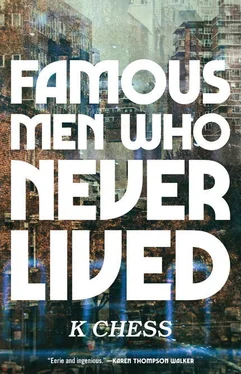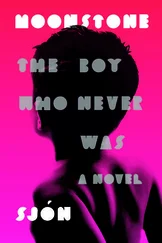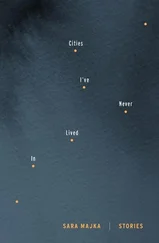Everything was like that. 1910 was the magic year, as far as anyone could prove. Before that was a known quantity. It was After—after 1910—that things slowly started to unzip, one set of possibilities uncoupling from another and veering off, gradually at first, but then more and more drastically.
Without exception, when UDPs like her gathered in groups, they asked each other what they’d brought through. It was almost a party game. People laughed at Hel’s practicality when she answered this question, when she described the water and the charger and the antihistamines.
The knife—that flick-blade she’d always carried—she’d concealed it in her shoe, but the sticks found it at the checkpoint, confiscated it before she passed through. She’d had to buy a replacement, later. She knew better than to mention that, even to UDPs. None of them would have found it funny.
Vikram, the man Hel lived with, had his own regrets. In his hurry, he’d brought only books, his backpack straining with them. Now, he mourned the loss of the picture albums from his New Jersey adolescence, photos from family vacations. Most keenly, Vikram rued his hasty abandonment of his mother’s bangle, an heirloom etched with Mughal designs passed through her family for generations. It could have fit right in the front pocket, he often said, where he’d made room for one more paperback instead.
Hel was glad he’d chosen books; UDPs who’d taken objects of more tangible value found themselves disproportionately likely to have that property missorted by the authorities during Debrief. She teased him, though, about his choice of titles. Why just literature—no science, no books on technology? (Because Vikram probably hadn’t owned any nonfiction at all, before he lived with her.) Why so many older books, books from long Before, which turned out to be superfluous? (Because he didn’t know—none of them had any way of knowing—and because he didn’t think he could live in a world without Rumi or Tolstoy or Jules Verne.) On the whole, Vikram made his selections with wisdom and luck. He’d saved novels by Darby Kenyon, by Grant Wilder, by Samara Vaugh. He’d preserved poetry by Nakamura Hideki rendered into luminous English by renowned translator A. J. Butler. These bestsellers, prizewinners, and canonical works existed in unique volumes on Hel and Vikram’s shared bookshelf in the Bronx. And he’d rescued an electrostat draft of his own unfinished dissertation, as well as the novel it treated. A slim paperback.
The Pyronauts by Ezra Sleight.
Why, Vikram lamented aloud sometimes, in moments of self-punishing sorrow, had he thought only of his job? Of his stupid life’s work, meaningless now.
“You weren’t thinking of work,” Hel would say, to comfort him. She could hear in her own voice a fierce protagonism. “You didn’t make a mistake. You were thinking about the persistence of our culture .”
In The Pyronauts , the world was cleansed by fire.
The aliens arrived in shield-shaped ships made of shining crystal on a mission of peace. They had monitored Earth’s communication broadcasts, so they already knew how to speak human languages and how best to solve earthly conflicts. Tall, wise, and graceful, with long appendages, the aliens were brilliant scientists as well as natural mediators. They went to the Council of Nations and disinterestedly fixed all the looming problems of Sleight’s early twentieth century. They gave the Jews of Europe a permanent homeland in Polithuania, convinced Japan not to attack the AMFR, introduced a hardier and faster-growing strain of millet to the starving Chinese, eliminated smallpox and the battle flu, and brokered a peace between the warring Dominico-American and Voudon armies. Humanity hailed them as heroes.
But then, to the chagrin of the aliens, the world they’d gone to so much trouble to save began to wither and die around its inhabitants. An extraterrestrial organism, a microscopic pirate from the homeworld that clung undiscovered to the hulls of their crystal ships or stowed away in the folds of their flowing robes, proved toxic. First to the trees, large and small, and then to the crop plants, and finally even to flowers, grasses, and lowly weeds. The pollinators starved and the animals famished and in their turn, the people of Earth began to suffer privations, suffering quickest and worst in the lands the aliens had visited personally. The blight spread, ungovernable, moving through water and air. The visitors invented a vacuum-canning process that would enable the beleaguered human population to preserve what was left of their stores, showed them a subterranean cultivation method for edible mushrooms, and then, with profuse apologies and vague promises to return, got into their shields and left Earth’s survivors to their own devices.
In North America, survivors formed scattered fortress-settlements underground or in those rare valleys whose natural topography provided some shelter from the killing winds, imposing quarantines to keep travelers from spreading the aliens’ final gift. Only the pyronauts—men and women in special suits whose job it was to burn all infected plantlife in the Neverlands, the abandoned world beyond the settlements—were given license to move freely.
Apparently, it all stood for something bigger. Hel remembered that from the high-form classes she’d taken against her will as a teenager. It reminded her of the Truth deck, of spreading the cards out in horseshoes on the bedspread and interpreting them for her sister. Literature always seemed to have some hidden meaning that a normal person wouldn’t guess. According to Vikram, most critics understood The Pyronauts to be an anti-colonial narrative and an anxious exploration of the possible consequences of the atom bomb. It was read and taught as a parable, warning its readers of the possible unforeseen results of harnessing a power greater than man to influence geopolitical affairs. Now, Vikram saw the novel as a trauma narrative speaking to the varied ways in which individuals cope with adversity. “What a conference paper I could write about it today!” he would say.
Or used to say, two years ago. Back when he still cared about Sleight.
In the book, pyronaut John Gund and his patrol-partner, Asyl, walked the hills of ash together in the waste-state of Pennsylvania with their tanks of fuel and their fire-spewing hoses. John Gund, a former cardsharp and all-around wastrel, had been serving a long prison term for shooting a rival gambler at the time the aliens arrived, and was let out by mistake in the ensuing upheaval. He found that he preferred the scorched Never to the flashy Philadelphia of his youth but felt he must keep this judgment, like all of the details of his personal history, a closely guarded secret from Asyl, young enough to be his daughter and born in a bunker city, who often asked him what the world had been like Before. (They used that term too; “the capital B audible in speech” was how Sleight’s narrator described it in the book.) John Gund and Asyl walked through the floating cinders on their endless patrol of the Never, checking every stalwart new blade of grass that poked its way out of the charred ground with their alien-provided test kits, always finding unacceptable traces of the microbes, inevitably having to burn each sprout. Together, they crouched in their fireproof tent in the evenings, the helmets of their suits removed so they could eat their miserable vacuum-sealed ration packets of fungal protein, and John Gund entertained Asyl with tales of Before, full of self-aggrandizement and lies of omission.
Lovely, innocent Asyl in the tent, her face framed by curtains of dark hair, who said her prayers every night and harbored stubborn illusions—she touched Hel in a way Hel didn’t really understand. Asyl, whose very name meant shelter.
Читать дальше













